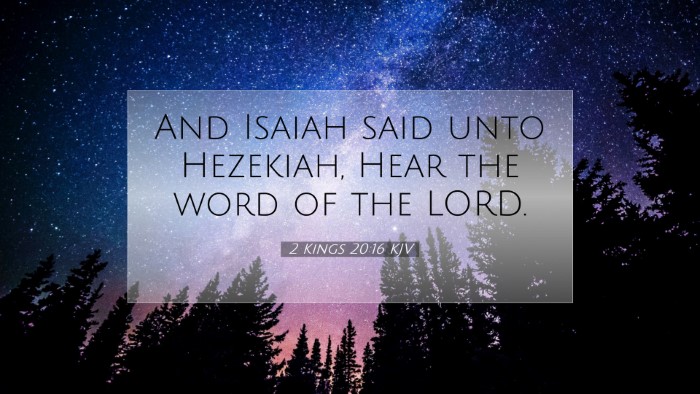Old Testament
Genesis Exodus Leviticus Numbers Deuteronomy Joshua Judges Ruth 1 Samuel 2 Samuel 1 Kings 2 Kings 1 Chronicles 2 Chronicles Ezra Nehemiah Esther Job Psalms Proverbs Ecclesiastes Song of Solomon Isaiah Jeremiah Lamentations Ezekiel Daniel Hosea Joel Amos Obadiah Jonah Micah Nahum Habakkuk Zephaniah Haggai Zechariah Malachi2 Kings 20:16
2 Kings 20:16 KJV
And Isaiah said unto Hezekiah, Hear the word of the LORD.
2 Kings 20:16 Bible Commentary
Commentary on 2 Kings 20:16
Verse Reference: 2 Kings 20:16
“Then Isaiah said to Hezekiah, ‘Hear the word of the Lord:’”
Introduction
The verse presents a significant transition in the narrative of King Hezekiah’s life, underscoring the prophetic role of Isaiah and the divine communication that shapes the course of Israel’s history. This commentary synthesizes insights from established biblical scholars to provide depth for pastors, students, theologians, and academics.
Contextual Analysis
The backdrop of this verse is Hezekiah's illness and miraculous healing (2 Kings 20:1-6), where God grants him a reprieve from death and extends his life for fifteen additional years. This moment is crucial as it emphasizes God's sovereignty and the unending mercy shown to His chosen people despite their failings.
Insights from Public Domain Commentaries
Matthew Henry’s Commentary
Matthew Henry highlights that Isaiah's role as a prophet is vital in conveying God’s word to Hezekiah. He emphasizes that when God speaks through His prophets, it demands attention and reverence. Henry comments on how the prophetic message serves both as a comfort and a caution. The promise of healing is overshadowed by the subsequent prophetic warning regarding the impending Babylonian captivity. Thus, God’s mercy is juxtaposed with human responsibility and the consequences of sin.
Albert Barnes’ Notes on the Bible
Albert Barnes elaborates on the significance of the phrase, “Hear the word of the Lord.” He argues that it reflects the necessity for human beings to listen attentively to divine revelations. Barnes notes that God’s communication often comes through unexpected channels, illustrating that wisdom should be sought in every situation. He contrasts Hezekiah's original response of humility and prayer with the later prideful attitude that ultimately leads to damaging consequences for Judah. His analysis reminds leaders of the necessity of remaining vigilant in their spiritual walk to avoid pitfalls that arise from pride and complacency.
Adam Clarke’s Commentary
Adam Clarke places emphasis on the transformation that Hezekiah undergoes in response to God's mercy. Clarke observes that such divine intervention should lead to a life of repentance and faithfulness. He critiques the tendency of believers to take God's blessings for granted. In Hezekiah's case, the healing and additional years were gifts that came with duties and responsibilities, including the necessity to maintain fidelity to God’s commandments. Clarke also looks forward, predicting the consequences of Hezekiah's later actions, and stresses the importance of heeding prophetic warnings as integral to a faithful walk with God.
Theological Implications
This verse and its commentary evoke significant theological themes such as:
- The Sovereignty of God: God controls the destinies of nations and individuals.
- Prophetic Authority: The role of the prophet is to convey God’s messages, which must be heeded with humility.
- Divine Mercy and Human Responsibility: While God's mercy is abundant, it also invites a response of faithfulness and obedience.
- The Weight of Legacy: The choices made by leaders can have dire consequences for their people.
Practical Applications
This commentary is relevant for leaders and congregants alike:
- Listening to God: Attentiveness to God’s word is vital for spiritual growth and guidance.
- Humility in Leadership: Leaders must recognize their dependence on God and the importance of remaining humble.
- Crisis as Opportunity: Moments of personal or communal crisis can lead to profound spiritual breakthroughs if approached with faith.
- Heeding Warnings: Disregarding prophetic counsel can lead to detrimental outcomes; wisdom lies in responsiveness to God.
Conclusion
2 Kings 20:16 is a pivotal moment that encapsulates the complex relationship between God and humanity, illuminated through the lens of prophecy. The insights gleaned from revered public domain commentaries serve to remind us of the dire importance of attentiveness to God’s word, the grace found in His mercy, and the critical implications of our responses to divine revelation. May this verse inspire all who encounter it to pursue a life marked by faithfulness and heedfulness.


